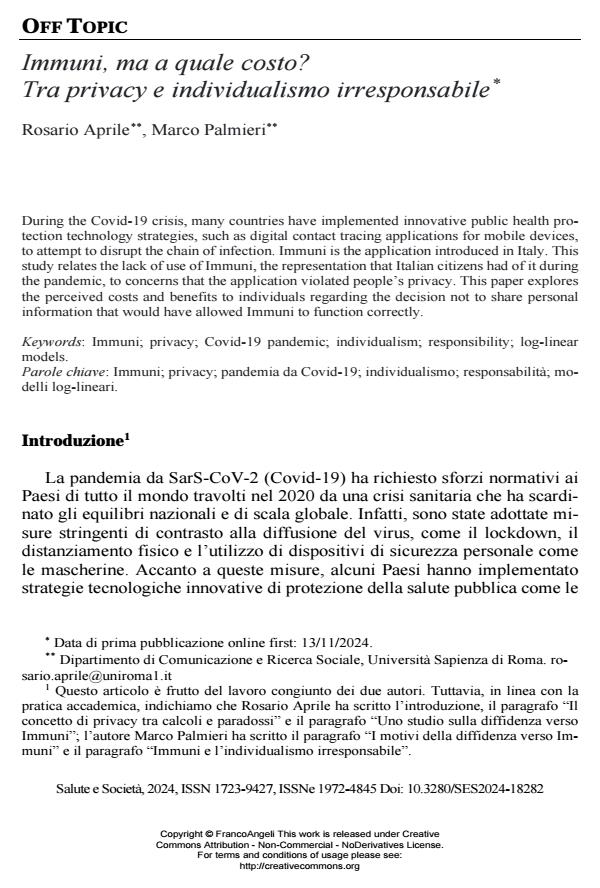Immuni, ma a quale costo? Tra privacy e individualismo irresponsabile
Titolo Rivista SALUTE E SOCIETÀ
Autori/Curatori Rosario Aprile, Marco Palmieri
Anno di pubblicazione 2025 Fascicolo 2025/2 Suppl.
Lingua Italiano Numero pagine 15 P. 149-163 Dimensione file 260 KB
DOI 10.3280/SES2024-18282
Il DOI è il codice a barre della proprietà intellettuale: per saperne di più
clicca qui

FrancoAngeli è membro della Publishers International Linking Association, Inc (PILA)associazione indipendente e non profit per facilitare (attraverso i servizi tecnologici implementati da CrossRef.org) l’accesso degli studiosi ai contenuti digitali nelle pubblicazioni professionali e scientifiche
During the Covid-19 crisis, many countries have implemented innovative public health protection technology strategies, such as digital contact tracing applications for mobile devices, to attempt to disrupt the chain of infection. Immuni is the application introduced in Italy. This study relates the lack of use of Immuni, the representation that Italian citizens had of it during the pandemic, to concerns that the application violated people’s privacy. This paper explores the perceived costs and benefits to individuals regarding the decision not to share personal information that would have allowed Immuni to function correctly.
Parole chiave:Immuni; privacy; pandemia da Covid-19; individualismo; responsabilità; modelli log-lineari.
- Acquisti A. (2009). Nudging Privacy: The Behavioral Economics of Personal Information. IEEE Security & Privacy, 7(6): 82-85.
- Barth S., de Jong M.D.T. (2017). The Privacy Paradox – Investigating Discrepancies between Expressed Privacy Concerns and Actual Online Behavior – A Systematic Literature Review. Telematics and Informatics, 34(7): 1038-1058.
- Benjamin G. (2017). Privacy as a Cultural Phenomenon. Journal of Media Critiques, 3(10): 55-74.
- Cesareo V., Vaccarini I. (2006). La libertà responsabile. Soggettività e mutamento sociale. Milano: Vita e Pensiero.
- Chen H.T. (2018). Revisiting the Privacy Paradox on Social Media with an Extended Privacy Calculus Model: The Effect of Privacy Concerns, Privacy Self-Efficacy, and Social Capital on Privacy Management. American Behavioral Scientist, 62(10): 1392-1412. DOI: 10.1177/000276421879269
- Citarella G. (2020). Considerazioni sull’APP Immuni. In: Dolso G.P., Ferrara M.D., Rossi D., a cura di, Virus in fabula. Diritti e Istituzioni al tempo del Covid-19. Trieste: EUT.
- Donnenwerth, G.V., Foa U.G. (1974). Effect of Resource Class on Retaliation to Injustice in Interpersonal Exchange. Journal of Personality and Social Psychology, 29(6): 785-793.
- Dryhurst S., Schneider C.R., Kerr J., Freeman A.L.J., Recchia G., van der Bles A. M., Spiegelhalter D., van der Linden S. (2020). Risk Perceptions of COVID-19 around the World. Journal of Risk Research, 23: 994-1006. DOI: 10.1080/13669877.2020.175819
- Ferrazzano M. (2020). Contact Tracing Via App: The Italian Experience and Privacy Issue. Humanidades y Tecnologia (Finom), 25: 114-126.
- Franco V. (2021). Responsabilità in tempi di pandemia. Politica&Società, 1: 3-16. DOI: 10.4476/10080
- Gerber N., Berens M., Volkamer B. (2019). Investigating People’s Privacy Risk Perception. Privacy Enhancing Technologies, 3: 267-288.
- Honneth A., Anderson J. (2005). Autonomy, Vulnerability, Recognition, and Justice. Cambridge: Cambridge University Press (trad. it.: Autonomia, Vulnerabilità, Riconoscimento e Giustizia. Perugia: Morlacchi, 2011).
- Jackson C.B., Wang Y. (2018). Addressing the Privacy Paradox through Personalized Privacy Notifications. ACM Journal, 2(2): 1-25. of Engagement with Social Media-Enabled Apps: A Privacy Calculus Perspective. Computers in Human Behavior, 107: 1-15.
- Martire F. (2012). La regressione logistica e i modelli log-lineari nella ricerca sociale. Milano: FrancoAngeli.
- Mazzara B., Mauceri S., Gavrila M. (2020). Gli italiani sotto l’onda anomala dell’emergenza. Il dominio dell’apprensione tra rischi percepiti e comportamenti responsabili. Milano: FrancoAngeli.
- Millefiorini A. (2005). Individualismo e società di massa. Dal XIX secolo agli inizi del XXI. Roma: Carrocci Editore.
- Newell P.B. (1998). Cross-Cultural Comparison of Privacy Definitions and Functions: A Systems Approach. Journal of Environmental Psychology, 18: 357-371.
- Norberg P.A., Horne D.R., Horne D.A. (2007). The Privacy Paradox: Personal Information Disclosure Intentions versus Behaviors. The Journal of Consumer Affairs, 41(1): 100-126.
- Pittito G. (2020). La sfida delle app contro il covid-19. GEOmedia, 24(1): 12-19. Plutino M. (2020). “Immuni”. Un’exposure notification app alla prova del bilanciamento tra tutela dei diritti e degli interessi pubblici. MediaLaw. Rivista di Diritto dei Media, 2: 172-193.
- Rutjens B.T., van der Linden S., van der Lee R. (2021). Science Skepticism in Times of COVID-19. Sage Journals, 24(2): 276-283. DOI: 10.1177/136843022098141
- Schwarzenberg T.L. (2005). The Evolution of the Concept “Privacy” and its Influence in Pediatric and Adolescent care. Rivista Italiana di Medicina dell’Adolescenza, 3: 5-18.
- Sennett R. (2004). Respect in an Age of Inequality. Londra: Penguin.
- Sipior J.C., Ward B.T., Connolly R., MacGabhann L. (2013). Privacy in Online Social Networking: Applying a Privacy Calculus Model. Pacific Asia Conference on Information Systems, 99: 1-11.
- Trepte S., Reinecke L., Ellison N.B., Quiring O., Yao M.Z., Ziegele M. (2017). A Cross-Cultural Perspective on the Privacy Calculus. Social Media and Society, 3(1). DOI: 10.1177/205630511668803
- Wang T., Danh Duong T., Chen C.C. (2016). Intention to Disclose Personal Information Via Mobile Applications: A Privacy Calculus Perspective. International Journal of Information Management, 36(4): 531-542.
- Wilson D.W., Valacich S. (2012). Unpacking the Privacy Paradox: Irrational Decision-Making within the Privacy Calculus. In: International Conference on Information Systems ICIS 2012, 4152-4162.
- Wisniewski P.J., Page X. (2022). Privacy Theories and Frameworks. In: Knijnenburg B.P., Page X., Wisniewski P., Heather R.L., Proferes N., Romano J., a cura di, Modern Socio-Technical Perspectives on Privacy. Berlino: Springer.
- Youn S. (2009). Determinants of Online Privacy Concern and Its Influence on Privacy Protection Behaviors Among Young Adolescents. The Journal of Consumer Affairs, 43(3): 389-417.
Rosario Aprile, Marco Palmieri, Immuni, ma a quale costo? Tra privacy e individualismo irresponsabile in "SALUTE E SOCIETÀ" 2 Suppl./2025, pp 149-163, DOI: 10.3280/SES2024-18282